reproduced from:EETimes
After continuous evolution over the years, the Internet of Things (IoT) has evolved from an emerging concept to a ubiquitous and popular technology. With the introduction of artificial intelligence (AI) and 5G, it has further expanded its application landscape, bringing safety and convenience to people’s daily life, promoting the digital transformation and upgrading of various industrial and commercial activities, and spawning countless innovative services and products. According to the estimates by Statista, a market research organization, the global IoT market will reach approximately US$389 billion in 2020, and this figure is expected to exceed US$1 trillion in 2023.
Optimistic about the development prospects of Taiwanese companies in the IoT field, the National Development Council (NDC) of Executive Yuan, the Ministry of Economic Affairs, and the Ministry of Science and Technology have jointly promoted the Asia Silicon Valley Development Plan (hereinafter referred to as ASVDP) to perform two main tasks: to “promote the innovation and R&D of the IoT industry” and to “upgrade the innovation and entrepreneurship ecosystem”. So far, the implementation has achieved fruitful results.
In terms of promoting industrial development, the output value of Taiwan’s IoT exceeded NT$1 trillion in 2018 and set a record high of NT$1.55 trillion in 2020, with a global market share of 4.62%. In addition to attracting major international companies such as Google, Microsoft, AWS, and Cisco to invest in Taiwan in cooperation with local industry players to develop innovative IoT application solutions such as smart factories and smart energy, the ASVDP has also facilitated 223 innovative application cases by the end of 2020 in the development of smart urban and rural applications such as smart transportation and smart medical care.
Taiwan is welcoming its “first year of 5G” in 2020. To accelerate the innovative application of 5G in the IoT, the ASVDP commissioned Chunghwa Telecom to set up in Taiwan the first Open Testing and Integration Centre (OTIC), an accreditation laboratory that has been reviewed and approved by the International O-RAN Alliance. Officially inaugurated in August this year, the OTIC provides testing services for 5G equipment interoperability, reliability and stress tests as well as the assessment of information security and other projects, hoping to help Taiwan’s 5G products to penetrate the world market faster. So far, 13 companies have submitted their applications for testing.
In terms of the construction of the innovation and entrepreneurship ecosystem, ASVDP’s venture angel investment program has invested NT$2.24 billion in 154 startups as of September this year, driving the total amount of related investment to NT$6.646 billion. Meanwhile, the international startup settlements such as Taiwan Tech Arena (TTA) and Linkou Startup Terrace have attracted more than 20 domestic and overseas accelerators and 600 startups. In accordance with the ASVDP, the NDC has not only taken the lead to set up and promote the national startup brand “Startup Island TAIWAN”, creating a consistent and positive image for Taiwan’s startups, but has also assisted 9 Next Big startups such as Gogoro in entering the international market.
To perfect the regulatory environment for startups is also a task that ASVDP continues to push. Through the implementation of “Act for the Recruitment and Employment of Foreign Professionals”, 3,111 “employment gold cards” have been issued as of September 2021, allowing talents such as Steven Shih Chen, founder of YouTube, to return to Taiwan to assist startup development. In addition, “Taiwan Innovation Board” and “Pioneer Stock Board” have been launched in Taiwan stock market since July, helping startups with key core technologies and innovation capabilities to accelerate their fund raising in the capital market.
Based on the above results, ASVDP has entered its “Version 2.0” this year. NDC stated that ASVDP 2.0 will achieve the vision of “Building Taiwan into a key force for digital innovation in Asia” through three major aspects: expanding the application of AIoT technologies, upgrading Taiwan’s startup ecosystem, and integrating local system integrators capacity and exporting products/services overseas. It is hoped to achieve five goals in the next four years: to cultivate three system integration companies at an international level, to reach 5% of global IoT share by 2025, to export 20 AIoT solutions, to facilitate the diversified exits of 40 startups and to help 200 startups to succeed.
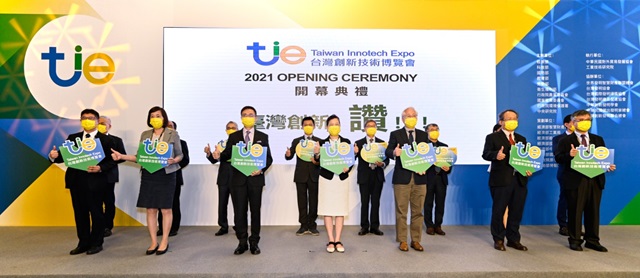
2021 Taiwan Innotech Expo (TIE) Opening Ceremony
Committed to promoting the fruitful achievements of IoT technology innovation and entrepreneurship, ASVDP also displays its concrete achievements in the annual Taiwan Innotech Expo (TIE). In response to the changes of COVID-19 pandemic, the TIE will debut for the first time in mid-October 2021 a hybrid event in which physical and virtual exhibitions will be combined to showcase the fruitful results in three themed pavilions, namely “Innovation Pilot”, “Sustainability” and “Future Tech” where presented will be thousands of innovative technologies and products in the fields of digital transformation, space technology, precision health, novel materials, new agriculture, and net zero carbon emissions. In the “Innovation Pilot” area, 22 Taiwanese technology startups will demonstrate their strengths in the hybrid exhibition booths set up by the Asia Silicon Valley Development Agency (ASVDA). The contents will cover four major types of applications, namely “advanced medical”, “smart manufacturing”, “smart life” and “digital transformation”. Among them, four digital transformation solution vendors will be introduced in the following, so that we can share their products and applications and use their examples to get a glimpse of the prospects of 5G and AIoT technologies and how they are being applied in our livelihood.
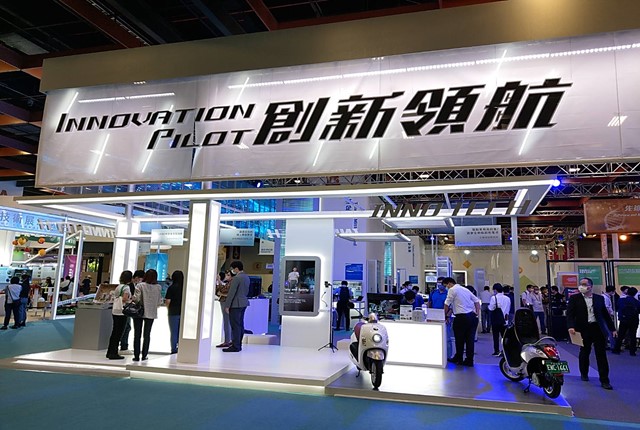
Innovation Pilot Exhibition Area

2021 Taiwan Innotech Expo (TIE) Online Exhibition
Gu-Le Co., established in 2018, will exhibit a heterogeneous signal AIoT gateway solution that targets at smart manufacturing applications. Its solution uses machine learning AI models to detect/determine in real time the abnormal current signal inside the machines on the production line. It can provide early warning of equipment failure and can integrate, on a single platform, various parameters/communication protocols, so as to greatly save for manufacturers the time and manpower of production equipment management and maintenance.
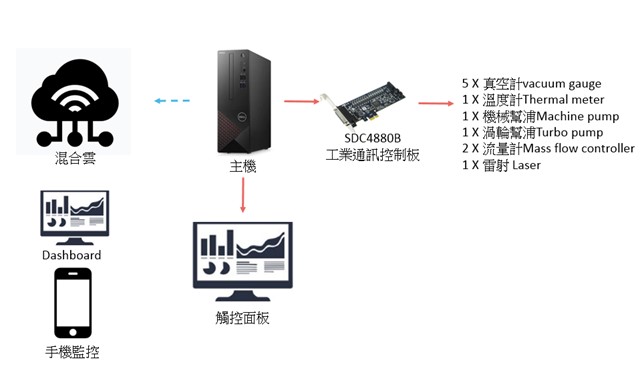
Gu-Le Co.’s heterogeneous signal AIoT gateway can integrate the monitoring parameters of different equipment on a single platform ─ sputtering machine monitoring case. (Images courtesy of Gu-Le Co.)
Yi-Rong Yang, Chief Operating Officer of Gu-Le Co., explained that the general manufacturing production line will have different process equipment and detection devices, such as stepping motors, vacuum pumps, heaters, pressure gauges, etc., whose communication protocols and parameter values are different. In the past, workers had to maintain them by monitoring and reading the meters on the spot and could hardly perform 24-hour monitoring or remote monitoring. Now, the technology jointly developed by Gu-Le and the Industrial Technology Research Institute can help the industries solve the above pain points.
Yi-Rong Yang said that Gu-Le’s team is good at hardware circuit design and software and hardware integration and can customize the deployment for each individual customer to meet its needs for monitoring all the production lines. Gu-Le’s actual application cases include the precision metal mold factories, the solar power plants, school laboratories, and so on; in the future, Gu-Le will continue to accumulate experience from the service cases, help smart manufacturing with more complete and integrated solutions, further expand its services to those companies with less than 5 employees and enter overseas markets.
Bayestek, a 7-year-old company, is also optimistic about the digital transformation and smart manufacturing needs for the traditional industries. Focusing on providing solutions for the digitization of production lines and manufacturing machine connection solutions, Bayestek has well established its presence in the precision machinery, textile and footwear industries in Taiwan. Originally a shoemaking company, Bayestek has cut into the smart manufacturing application market because its team is good at communication technology and software algorithms and can provide one-stop fast equipment/device networking solutions.
Xin-Yi Shao, Vice President of Bayestek, said that today’s shoemaking industry is no longer a traditional industry. It involves many complicated processes, especially in the front-end steps of forming the shoe body for such products as sports shoes. The ability to accurately monitor and control the subtle changes in parameters such as temperature and pressure of raw materials on the production line has a critical impact on the quality of the final product. Bayestek has accumulated large amounts of experience in the networking of machines and equipment on the production line and in collecting the required parameters through close cooperation with shoe factory customers that are original equipment manufacturers (OEM) for international brands. Based on this, Bayestek has penetrated the metal processing industry to provide rapid deployment of overall smart manufacturing solutions at a reasonable cost, thus helping customers improve production efficiency and enabling such products as automotive parts that demand very strict safety requirements to meet international quality standards such as ISO16949.
Xin-Yi Shao pointed out that Bayestek’s current team has only 8 members. It is a technology-based R&D company with software as the core. Its competitive advantage lies in its flexibility in meeting the deployment needs of customers in the manufacturing or agriculture, fishery and animal husbandry industries, as well as working with partners such as system integrators and machine manufacturers. In addition to the local market, Bayestek has also been testing the international markets when it helps to deploy production lines for overseas customers in Vietnam, Indonesia, Cambodia and so on. Bayestek hopes to further expand its global footprint after the COVID-19 pandemic gradually slows down.
All Aspect System (AAS) is a company founded in 2017. Its founder and CEO Chen-Ming Kuo originally taught at Department of Mechanical Engineering, Chung Yuan Christian University but entered the commercial market with his expertise in intelligent unmanned vehicle system integration and control solutions. At present, AAS has been using its unmanned boats to assist several government contractors, through the mode of project cooperation, to monitor the water quality of reservoirs and patrol the seaport waters. In the future, AAS plans to enter the overseas market starting from the Japanese market.
Chen-Ming Kuo said that whether it is water quality inspection or water area patrol, the traditional manual execution mode is expensive and cannot achieve the task under bad weather. It can be only achieved by using self-driving boats equipped with detection devices and without human manipulation, thus not only greatly saving time and manpower but also ensuring the safety of on-site workers. In cooperation with telecommunications companies, these unmanned vehicles can also transmit important messages in real time through wireless communications, achieving such goals as disaster prevention and emergency relief. In addition, AAS’s unmanned vehicle system is designed for power saving and internal data protection. In addition to supporting inspections and collecting hydrogeological data in large areas of water, AAS’s unmanned vehicle system can also support defense and security related applications through aerial vehicles such as drones.
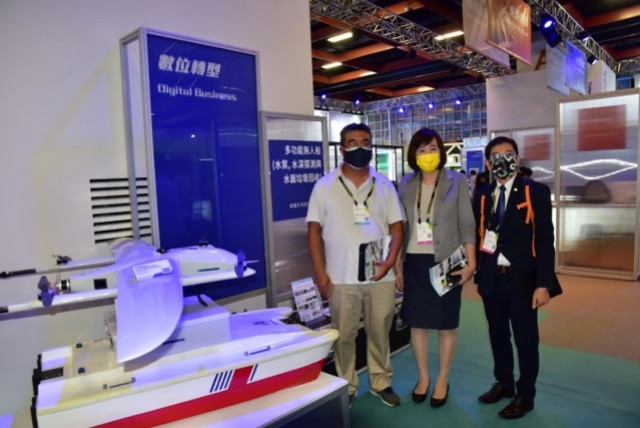
AAS Company explained the “Multifunctional Unmanned Ship” to Xian-Gui Gao, Deputy Minister of NDC and Bo-Rong Lee, Chief Executive of ASVDP
Through word-of-mouth marketing from existing customers and participation in international unmanned vehicle competitions, AAS’s intelligent unmanned vehicle system has won the favor of Japanese industry players, who have been currently negotiating with AAS for further cooperation; Chen-Ming Kuo pointed out that Japanese industry players have particularly high requirements for technical safety and stability. Therefore, AAS plans to firstly hone its skills and experience in the Japanese market and then uses the actual results to penetrate the European and American markets. As unmanned vehicles have been used in all parts of the world to perform those tasks which are carried out by high-cost manpower for a long time or in a high-risk environment, the future market for unmanned vehicles is highly anticipated.
In Taiwan, IoT applications are often seen in the industrial and commercial manufacturing industries, but very rare in the agricultural sector where product profits are low. Tano Secure Inc., established in 2016, is such a rare startup company specializing in smart agricultural applications. Its founder and CEO Jian-Zhang Chen said that, originally an engineer in the ICT industry, he has been rolling up his trousers to work in the rice fields since 2010. Through his personal experience of the daily life of farmers, he has further mastered how to use digital technology to help Taiwan’s farming and animal husbandry industries to improve production efficiency and profitability.
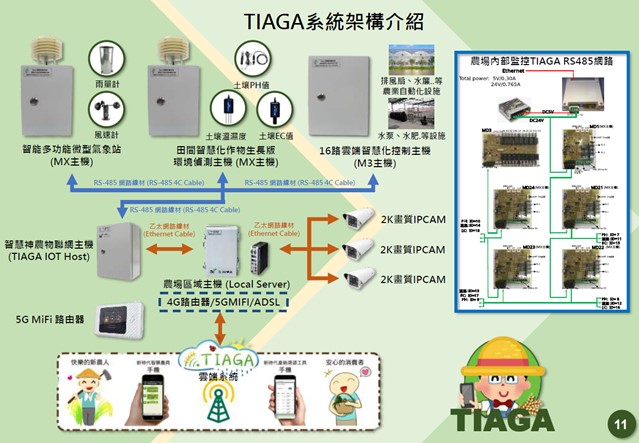
Tano’s smart agriculture system is modularized and standardized to achieve rapid replication and deployment and emphasizes simplicity and ease of use. (Images courtesy of Tano Secure Inc.)
Jian-Zhang Chen said that Tano’s TIAGA Smart Shennong System is a standardized module. Therefore, even though customers may have very different environments and monitoring requirements for crop planting and animal husbandry, Tano can still achieve rapid replication and deployment (It takes about 7 working days to survey and plan for the field but only 2 working days for installation and construction). Not only does the system include 5G communication on the farm side (in cooperation with telecom operators such as Chunghwa Telecom, Taiwan Star Telecom, and so on), image monitoring, various sensors (for monitoring water quality, temperature, and the soil) and control equipment, as well as a software platform that provides farm management personnel with monitoring and analysis through mobile phones or PCs, but it can also help producers build sales channels and provide information for product traceability queries to meet the food safety requirements of end consumers. Moreover, Tano not only adopts the business model of “renting instead of buying” its system to allow farmers to join the ranks of smart agriculture at an affordable cost but also emphasizes the simplicity and ease of use of its system under the concept that “a mobile phone is a new farm tool”.
In addition to the non-toxic farm in the Longtan District of Taoyuan City that Jian-Zhang Chen has built to meet the needs of cancer patients, Tano’s system has been currently introduced into cantaloupe greenhouses, chicken farms, and tea gardens scattered in the north and south of Taiwan. Jian-Zhang Chen pointed out that Tano’s system has won the “Top Innovator Award” in the World Bank’s Agriculture Innovation Challenge in 2020 and it is favorably received with many collaborative consultations from industry players from Japan, China, Russia and other regions. However, affected by the COVID-19 pandemic, Tano’s overseas market expansion plan has been blocked temporarily, but it has gained more customers in Taiwan, instead. Currently, the farms in cooperation have increased from the original two to the ninth being in the process of deployment. In addition to continuing to promote popular smart agriculture solutions, helping farmers increase productivity and profitability, and nurturing more talents who are interested in investing in smart agriculture, Tano also hopes to contribute its effort to the reduction of global greenhouse gas emissions by advocating low-carbon agriculture.
TIE online exhibition:
https://tievirtual.twtm.com.tw
TIE physical exhibition: from October 14th to 16th at Hall 1 of Taipei World Trade Centre (TWTC)